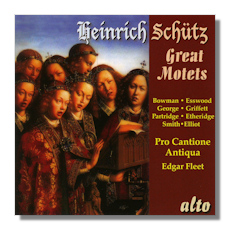
The Internet's Premier Classical Music Source
Related Links
- Schütz Reviews
- Latest Reviews
- More Reviews
-
By Composer
-
Collections
DVD & Blu-ray
Books
Concert Reviews
Articles/Interviews
Software
Audio
Search Amazon
Recommended Links
Site News
 CD Review
CD Review
Heinrich Schütz

12 Motets
- Hodie Christus natus est for 2 Sopranos, Alto, 2 Tenors, Bass & Continuo, SWV 456
- Fili mi, Absalon for Bass, 2 Violins, 2 Trombones & Continuo, SWV 269 (Op. 6)
- Auf dem Gebirge for 2 Altos, 5 Instruments & Continuo, SWV 396 (Op. 11/28)
- Heu mihi, Domine for Soprano, Alto, Tenor, Bass & Continuo, SWV 65 (Op. 4/13)
- Ich danke dir, Herr for Soprano or Tenor, 2 Violins & Continuo, SWV 347 (Op. 10/7)
- Der Engel sprach zu den Hirten for Soprano, Tenor, Bass, 4 Instruments & Continuo, SWV 395 (Op.11/27)
- O quam tu pulchra es for Tenor, Baritone, 2 Violins & Continuo, SWV 265-266 (Op. 6/9-10)
- Die Seele Christi heilige mich for Alto, Tenor, Bass & Continuo, SWV 325 (Op. 9/20)
- Was mein Gott will, das gscheh allzeit for Alto, Tenor, 4 Instruments & Continuo, SWV 392 (Op. 11/24)
- Exultavit cor meum in Domino for Soprano, 2 Violins & Continuo, SWV 258 (Op. 6/2)
- Selig sind die Toten for 2 Sopranos, Alto, 2 Tenors, Bass & Continuo, SWV 391 (Op. 11/23)
- Auf dem Gebirge for 2 Altos, 5 Instruments & Continuo, SWV 396 (Op. 11/28)
Bradford Tracey, organ
Pro Cantione Antiqua
London Cornett and Sackbut Ensemble
Restoration Academy
The English Consort of Viols/Edgar Fleet
Musical Concepts Alto ALC1118
This is a delightful reissue and digital remastering of a collection of motets by Heinrich Schütz (1585-1672) originally released in the late 1970s on AS&V. Pro Cantione Antiqua under Edgar Fleet is joined by a selection of eight male soloists, Bradford Tracey (organ), the London Cornett and Sackbut Ensemble and the Restoration Academy in performances that are highly atmospheric. Indeed, they make up in emotional impact what they lack in authenticity… it's hard to imagine today's performers bringing as much almost romantic vocal color (particularly the high voices' discrete vibrato) to Auf dem Gebirge, SWV 396, [tr.3], for example. The music's determination and expression, though, make compelling listening.
The greatness, technical depth – in melody and scoring, in particular – profundity and sheer musical inventiveness which are evident in everything Schütz wrote have to qualify the composer as one of the most under-estimated of the truly great composers of his time, if not all time. So any contribution to his discography is welcome. For, even without such a need for greater recognition, these are convincing performances which ooze sincerity and commitment. The tempi are just and dignified. The sonorities sweet and rich. Schütz's characteristically burnished, ruby textures and plangent melodies captivate from first moment to last in a CD lasting an hour – one which makes you want to go straight back to the start as soon as it's over.
It was hard for Schütz to conceal the turbulence of his times – both socially and politically… much of his life was profoundly affected by the Thirty Years War. And musically… he traveled to Denmark and Venice and both influenced and was influenced by developments outside his native Dresden, where he spent nearly 60 years of his long (87 years) life. Without Schütz there could have been no Bach or Handel. Yet his musical tone is modest, unswerving in its religious conviction and – like Bach's – human to the core.
The dozen sacred motets on this disc mostly date from the earlier period of Schütz's career… before 1640. Highlights are Fili mi, Absalon, SWV 269 [tr.2], the longest piece, at almost eight minutes; Hodie Christus natus est, SWV 456 [tr.1] and Was mein Gott will, SWV 258 [tr.9]; Heu mihi, Domine, SWV 65 [tr.4]; and the two versions (for solo and duet) of Auf dem Gebirge, SWV 396 [tr.s 3,12]; although there is not a piece here which fails to please.
There is a balance struck by these vocalists and instrumentalists alike between insistence (in the interests of advancing the undiluted confessional burden of Schütz's motets) and a certain unobtrusive sweetness and sensitivity (which promote approachability to the music's innate beauty). They clearly know the music well and are at home in its idiom. At the same time, their dynamism and clarity make it sound fresh, if not entirely authentic in articulation, as said.
Some of these are the only recordings of these works… Auf dem Gebirge, SWV 396 and Ich danke Dir, Herr SWV 347, for example. The acoustic is very dry but suited to the intimate, rather than expository, approach taken by Fleet. The liner notes contain outline details of the works and texts in Latin, German and English. If you love Schütz enough to want to enlarge your collection at all opportunities, don't hesitate: although the somewhat dated style of vocal delivery will be off-putting to some, it's full of passion and heartfelt dedication to the composer's genius. Probably not the place to start such a collection. But a reissue not to be missed nevertheless.
Copyright © 2011, Mark Sealey.





















